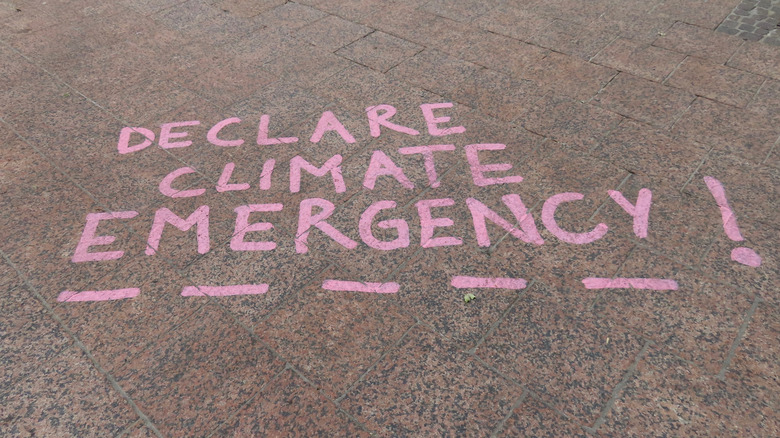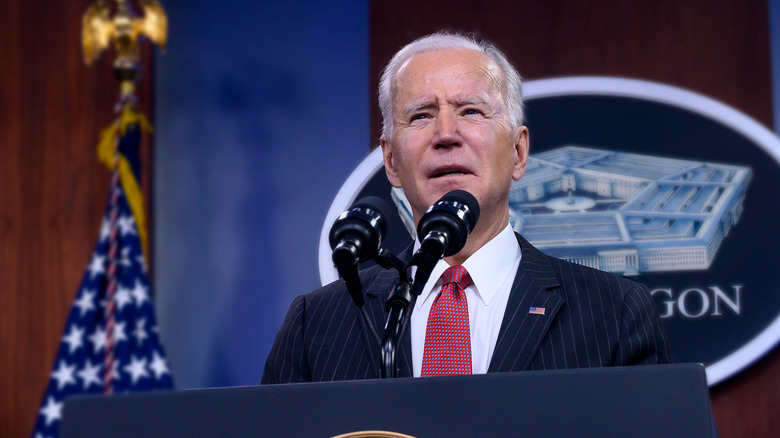What Would Happen If The US Declared A Climate Emergency?
In the summer of 2022, a devastating heat wave struck parts of the United States (also while a similar heat wave was broiling parts of Europe). As the Washington Post reported, in the U.S., 100 million people in 28 states were at one time or another dealing with temperatures and/or heat indices in the triple digits, and another 100 million people would experience highs in the 90s. In addition to the devastating effects the heat has on humans and animals, the effects of this phenomenon extend beyond other areas of life. The electrical grid is taxed due to more use of air conditioning; wildfires are popping up, and those are just two examples.
The immediate cause of all of this misery is what scientists call a "heat dome," a ridge of high pressure that sends the jet stream north and allows hot conditions to flourish. However, in a larger sense, the heat wave is juxtaposed with the ongoing effects of climate change which, according to National Geographic, is only getting worse.
Governments, including the U.S., have at their disposal a legislative and economic tool for just such a situation: a declaration of a climate emergency, which other countries have made, including Scotland and Wales, which were the first nations the first to do so in 2019, according to the website Climate Emergency Declaration.
What A Climate Emergency Declaration Means
Depending on where it's made and by whom, a declaration of a climate emergency can be either simply a platitude that states that climate change is a serious problem needing attention, or an actual legislative act that, in theory anyway, is followed up with action.
The first climate emergency declaration made by a government was in the former category. Back in 2016, according to Climate and Community Action in the Climate Emergency, the government of the Melbourne suburb of Darebin passed a resolution that stated, "[The] Council recognises that we are in a state of climate emergency that requires urgent action by all levels of government, including by local councils." Though it was little more than words on a page, the declaration was "a significant step in Australia as the concept of framing global warming as an emergency had been actively opposed by major NGOs at the time," notes the website.
When Wales declared a climate emergency in 2019, however, it was accompanied by action, according to BBC News. Along with the declaration came a commitment from the country to"[achieving a] carbon neutral public sector by 2030." If such a declaration were made in the U.S., it would be followed by action, both immediate and long-term, according to Newsweek.
A Climate Emergency Declaration In The US
If a climate emergency declaration were to be made in the U.S., as Yahoo News reports, such a declaration would allow the executive branch to take action on certain climate issues with the approval of Congress. For example, it could halt exports of American crude oil, and could put a moratorium on offshore oil drilling. It could impose penalties on countries engaged in contributing to climate change, such as Brazil, where the Amazon rainforests are being destroyed largely unchecked. It could even allow the president to divert money from the military budget to whatever they believe needs attention, and in fact, there's precedent for this kind of shuffling money, although it doesn't necessarily relate to climate change. Back in 2020, as NPR News reported, then-President Donald Trump diverted $3.8 billion of money from the Defense Department's budget towards the construction of a border wall along the U.S.- Mexico border.
However, should any such "extreme" measures be taken by the executive branch, they would almost certainly be delayed by inevitable lawsuits from, for example, oil companies or the opposition party. It's also worth mentioning that any such action would simply be one phase of a process that would take decades.
Pressure on Joe Biden To Declare A Climate Emergency
As of July 20, 2022, U.S. President Joe Biden had not yet declared a Climate Emergency, although he's been facing consistent pressure to do so, according to The Guardian. Just days earlier, Biden's climate change agenda was thwarted when his Democratic ally in the Senate, West Virginia Senator Joe Manchin, withdrew his support from the legislation, effectively making it dead on arrival. That has led to pressure on the POTUS to circumvent the regular legislative process and instead enact the climate emergency declaration.
For example, Oregon Senator Jeff Merkley tweeted "[Biden] needs to go big on climate –- starting by declaring a climate emergency so we can take bold action NOW on the disastrous impacts climate chaos has on our health, environment, and economy."
As of July of 2022, Biden may be leaning in that direction. White House Press Secretary Karine Jean-Pierre told reporters at a White House briefing, "I would not plan an announcement this week on a national climate emergency. Again, everything is on the table. It's just not going to be this week on that decision ... I don't have a date circled on the calendar," (via The Guardian). Also unclear is what actions Biden would take if he were to enact such a declaration.
It Would Take Years Before It Made Any Difference
Even if President Joe Biden declared a climate emergency today, it would be years if not decades before any of the effects of the declaration were felt. For example, if Biden diverted, say, $10 billion to building wind turbines, there would be reams of red tape to be unspooled and cut through -– identifying and buying the land to build them on, hiring workers to build them, hiring workers to maintain them, etc. –- and it could be years before the first one started spinning, and decades before their effect on the reduction of carbon dioxide in the atmosphere would be felt. By that time the world will have experienced multiple more hot summers.
Further still, the preceding paragraph assumes that a declaration, and the plans associated with it, go through without any legal hassles. That's a fool's hope, however. There would almost certainly be fierce opposition from within the government, there could (and almost certainly would be) lawsuits that could tie up the efforts for years, and anything and everything could simply be undone by the next president if they are not on board with addressing climate change quite so proactively.




